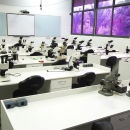Courses
Among the courses offered by the Graduate Program in Plant Pathology, four (04) of them are required for Master’s and/or Doctorate students, which are: Mycology, Virology, Nematology and Bacteriology. The minimum credits are 24 for both Master’s and Doctorate students. Click on the name of the course below to obtain more information regarding the professor in charge of it, the number of credits, when the course will be offered and other information.
Physiology of science and the scientific method. History of plant pathology in the world and in Brazil. Current topics in plant pathology. Communication in plant pathology. Preparation of research projects. Ethics in plant pathology.
Professor(s): Luiz Antonio Maffia
Number of credits: 3
Semester: I (even years)
Prerequisite: None
Epidemiology and its importance to plant pathology. Effect of the environment on epidemics. Quantification of the intensity of diseases. Disease progress. Spread of diseases. Application of the epidemiological principles for the management of plant diseases. Epidemiology and integrated disease management.
Professor(s): Emerson Medeiros Del Ponte
Credits: 3
Semester: II
Prerequisite: None
Introduction to the literature relevant to the diagnosis of plant diseases. Clinical study of plant diseases. Importance of plant disease diagnosis and the pathogenicity tests. Factors that predispose plants to diseases. Symptoms and signs of diseases affecting the major crops. Methods to sample diseased plants, herbarization of the material and preparation of samples to send to the laboratory; preparation of the diagnostic record. Planning a laboratory for disease diagnostic. Basic biotechnology methods for the identification of fungi, bacteria, viruses, nematodes and fastidious bacteria affecting different crops. Abiotic diseases. Symptoms on plants caused by soil physical impairments. Symptoms of nutrients deficiency.
Professor(s): Laércio Zambolim
Credits: 3
Semester: I
Prerequisite: None
History of forest pathology. Etiology of forest diseases. Symptomatology of forest diseases. Epidemiology of forest diseases. Fundamental principles applied to control forest diseases. Tree defense mechanisms (bark and wood) against abiotic and biotic agents. Urban forestry problems. Cloning as a tool to control and improve Eucalyptus resistance to diseases. Breeding Eucalyptus for disease resistance. Mycorrhizae.
Professor(s): Acelino Couto Alfenas
Credits: 4
Semester: I
Prerequisite: None
Basic statistics. Scientific methodology. Choice of designs and analysis of variance of experiments conducted in laboratory, greenhouses and in the field in different areas of Plant Pathology. Regression analysis and correlation applied to Plant Pathology. Multivariate analysis. Computer software for statistical analysis.
Professor(s): Emerson Medeiros Del Ponte
Credits: 3
Semester: I
Prerequisite: None
Importance of seed pathology and post-harvest pathology of vegetables. Anatomy and physiology of seeds related to seed pathology. Seed diseases and mycotoxins production. Post-planting seed diseases. Infection and seed infestation by pathogens: plant-pathogen-seed relationship. Transmission of pathogens by seed: seed-pathogen-plant relationship. Disease epidemiology caused by pathogens transmitted by seeds. Principles for establishing tolerance limits of pathogens in seeds. Seed pathogen detection methods. Principles and pathogen control methods in seeds. Fungal seed deterioration during storage and formation of mycotoxins. Post-harvest pathology of vegetables. Etiology, symptoms and control of post-harvest diseases.
Professor(s): Olinto Liparini Pereira
Credits: 3
Semester: II
Prerequisite: None
Research and organization of bibliographic information. Scientific writing. Equipment and sterilization methods. Safety in a Plant Pathology Laboratory. Fungal nutrition and culture media preparation. Isolation and storage of plant pathogens. Inoculation of plant with different pathogens. Quantification of diseases. Electrophoresis of proteins and nucleic acids. Light microscopy. Scanning electron microscopy. Confocal microscopy. Technical photomicrography and photography.
Professor(s): Gleiber Quintão Furtado, Claudine Márcia Carvalho, Emerson Medeiros Del Ponte and Fabrício de Ávila Rodrigues
Crédits: 3
Semester: I
Prerequisite: None
Evolution, systematics and fungi classification. Fungal genetics. Fungal physiology. Fungi from the Protista Kingdom. Fungi from the Chromista/Straminipila Kingdom. Fungi from the Fungi Kingdom. Control of fungal diseases.
Professor(s): Robert Weingart Barreto
Credits: 4
Semester: I
Prerequisite: None
History and importance. Morphological and biological characteristics of nematodes. Ecological relationships. Pathogenic relationships. Nematode interaction with other pathogens. Basic considerations for the control of nematodes. Prevention of nematodes spread. Reduction of nematodes population through soil management and cultural practices. Use of heat, biological control, resistant cultivars and chemicals for the control of nematodes.
Professor(s): Leandro Grassi de Freitas and Rosangela D’Arc de Oliveira Lima
Credits: 3
Semester: II
Prerequisite: None
History and importance of plant virology. Symptoms induced by plant viruses in plants. Morphology and structure. Viral replication strategies. Cell-to-cell and long distance movement. Infectious sub-viral agents. Natural transmission. Control of plant viruses.
Professor(s): Francisco Murilo Zerbini Júnior
Credits: 3
Semester: I
Prerequisite: None
History and economic importance. Anatomy and morphology of the bacterial cell: immunology, metabolism and growth of bacteria and major recombination processes. Taxonomy of bacteria. Symptomatology. Penetration, colonization, multiplication and movement of bacteria on diseased tissues and histopathological aspects of the colonization process. Seed pathology in bacteriology. Survival and spreading of bacteria: life cycle and its implications for spread and survival. Bacterial diseases and their control methods.
Professor(s): José Rogério de Oliveira
Credits: 3
Semester: II
Prerequisite: None
Principles involved in plant disease control. Chemical, biological, cultural and legislation control of plant diseases. Forecasting to prevent plant diseases. Fungal resistance to fungicides. Mechanisms of fungicides action. Seed treatment. Safe handling and use of pesticides. Plant transformation for plant disease control. Post-harvest treatment. Plant resistance to diseases. Systemic acquired resistance. Integrated disease management.
Professor(s): Laércio Zambolim
Credits: 4
Semester: II
Prerequisite: None
Biological control of plant diseases. Microbial antibiosis. Biological control by induction of plant resistance to pathogens. Strategies for selecting microbial biocontrol agents. Commercial application of biocontrol agents to reduce plant diseases.
Professor(s): Leandro Grassi de Freitas
Credits: 3
Semester: I
Prerequisite: None
Concepts of population biology. Selection and variability in populations. Mutation and variability in populations. Migration and variability in populations. Genetic drift and variability in populations. Recombination and variability in populations. Useful tools and resources to study population biology.
Professor(s): Eduardo Seiti Gomide Mizubuti
Credits: 4
Semester: I
Prerequisite: None
Importance of studying the host-pathogen interactions. Plant cell. Events of pathogenesis. Enzymes. Toxins. Physiological changes on plants during the infection process of pathogens. Mechanisms of host resistance against pathogens. Induced host resistance.
Professor(s): Fabricio Ávila Rodrigues
Credits: 4
Semester: I
Prerequisite: None
Structure and function of macromolecules. Replication of nucleic acid and protein synthesis. Recombinant DNA techniques. Basic notions of bioinformatics. Diagnosis of plant pathogens using molecular techniques. Molecular markers. Plant transformation for plant disease control. Genomics of plant pathogens.
Professor(s): Francisco Murilo Zerbini Júnior
Credits: 3
Semester: II
Prerequisite: FIP 608
History on the biological control of nematodes. Soil environment. Antagonistic organisms. Agricultural practices and biological control. Mass production and introduction into the soil. Planning and conducting experiments on biological control. Future perspectives.
Professor(s): Leandro Grassi de Freitas
Credits: 3
Semester: II
Prerequisite: FIP 620
General aspects of viral replication. Virus with a positive ssRNA genome (I, II, III, IV and V). Virus with a negative ssRNA genome. Virus with a ssDNA genome. Virus replicating by reverse transcription. Cell-to-cell and systemic movement of plant virus. Pathogen-derived resistance. Taxonomy and evolution of plant viruses.
Professor(s): Francisco Murilo Zerbini Júnior
Credits: 3
Semester: II
Prerequisite: FIP 630
Importance and diversity of prokaryotic organisms. Concept of species for prokaryotic organisms. Taxonomy and nomenclature of plant pathogenic bacteria. Identification of plant pathogenic bacteria: classical and molecular techniques. Pathogenicity of plant pathogenic bacteria.
Professor(s): José Rogério de Oliveira
Credits: 3
Semester: I
Prerequisite: FIP 640
Variability in plant pathogens. Mechanisms of variation in bacteria and fungi. Genetics of plant pathogenic fungi. Physiological specialization. Concept of races, strains and biotypes. Gene interaction between pathogen and host: the gene-to-gene theory. Molecular markers in the genetics of plant pathogens and plants resistant to diseases: Fflp, isoenzymes and allozyme. Vertical and horizontal resistance. Multiline concept. Inheritance of resistance factors. Nature of resistance: morphological, physiological and biochemical.
Professor(s): Sergio Herminio Brommonshenkel
Credits: 3
Semester: II
Prerequisite: FIP 608 or FIP 650
History of the Electron Microscopy. Operating principles of the scanning and transmission electron microscopes. Ultramicrotomy. Transmission electron microscopy. Scanning electron microscopy. Photodocumentation.
Professor(s): Fabricio Ávila Rodrigues
Credits: 3
Semester: II
Prerequisite: None
This course aims to provide the graduate students in Plant Pathology experience in teaching as well as on planning, preparation and teaching classes for undergraduate students under the supervision and monitoring of a professor. The internship may include conducting discussion sessions aiding in the preparation of classes, teaching certain topics in practical classes and mentoring activities.
Professor(s): Rosangela D’Arc de Lima Oliveira
Credits: 1
Semester: I and II
Prerequisite: Doctoral students who completed all course credits
This course aims to provide the graduate students in Plant Pathology experience in teaching as well as on planning, preparation and teaching classes for undergraduate students under the supervision and monitoring of a professor. The internship may include conducting discussion sessions aiding in the preparation of classes, teaching certain topics in practical classes and mentoring activities.
Professor(s): Rosangela D’Arc de Lima Oliveira
Credits: 1
Semester: I and II
Prerequisite: Doctoral students who completed all course credits
Offers the graduate students the opportunity to study topics related to their area of research and of importance for their formation.
Offers the graduate students the opportunity to study topics related to their area of research and of importance for their formation.
Offers the graduate students the opportunity to study topics related to their area of research and of importance for their formation.
Presentation of seminars by the graduate students from different subjects of Plant Pathology, including also seminars from their research projects. Seminars from invited speakers.
Professor(s): Claudine Márcia Carvalho
Credits: Master: 1. Doctorate: 2
Semester: I and II
Prerequisite: None
Research of the graduate students in Plant Pathology.
Professor(s): Fabricio Ávila Rodrigues
Credits: 0
Semester: I and II
Prerequisite: None


